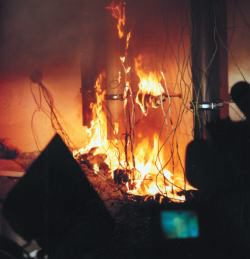Independent fire tests compare plastics and cast iron

Independent tests in Germany show the devastating effect of fire on plastic-based drainage systems, while the cast-iron in the foreground is unaffected.
The use of plastics-based pipes for above-ground drainage systems aids the spread of fire, according to tests carried out in a German research laboratory. An HDPE sanitary pipe system, a PVC sanitary pipe system and a twin-wall PVC sanitary pipe system were tested alongside cast-iron pipes in research commissioned by IZEG, the German association for manufacturers of cast-iron pipes. The full-scale test lasted just 35 minutes before it was stopped for safety reasons. The fire test was set up over three floors — the fire compartment on the ground floor, a floor below and a floor above. In less than three minutes, the plastic in the fire compartment had started to melt. Within 10 minutes, molten plastic droplets had bypassed the intumescent fire collars and ignited in the basement areas. Dense smoke filled the fire compartment within 15 minutes, and within 25 minutes the fire was raging in the basement below. At 30 minutes, toxic gases had been generated in the basement. All the plastics systems were installed according to manufacturers’ guidelines and in accordance with local building regulations. The plastics systems were fitted with the recommended intumescent fire collas, and the cast-iron system was sleeved through the compartment walls. The test was designed to challenge the claims of plastics manufacturers and, according to Saint-Gobain Pipelines, which makes cast-iron systems, shows that plastic-based systems pose a fire hazard with their inability to prevent its spread down through a building. Alan Gwilliam of Saint-Gobain, says, ‘The test was actually aborted at 35 minutes in the interests of safety. By then, it had proved beyond all doubt that plastic-based systems melt, catch fire and spread flames downwards. ‘The flames burned both up and down the individual pipe lengths, which doubled the rate that the fire spread. Effectively, this doubles the risk of trapping occupants and exposing them to toxic fumes, which are the biggest killer in the first 30 minutes of every fire.’
Related links:


